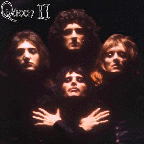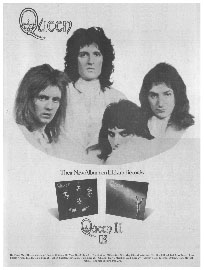![]()
  |

Queen II
Queen
Elektra EKS 75082
Released: May 1974
Chart Peak: #49
Weeks Charted: 13



 Above all else, Queen excels. They excel at playing highly visceral rock 'n roll, they excel at bringing mythological elements into their music and appeal, they excel at being intelligent, they excel at creating an image constant with their name without being a bunch of poofs, and they excel at selling records. The audience is already here for Queen, they've got radio acceptance (stations are playing the LP a side-at-a-time), public acceptance, and critical acceptance, and the only reason to review this album at all is purely for critical evaluation.
Above all else, Queen excels. They excel at playing highly visceral rock 'n roll, they excel at bringing mythological elements into their music and appeal, they excel at being intelligent, they excel at creating an image constant with their name without being a bunch of poofs, and they excel at selling records. The audience is already here for Queen, they've got radio acceptance (stations are playing the LP a side-at-a-time), public acceptance, and critical acceptance, and the only reason to review this album at all is purely for critical evaluation.
Yet on a critical level it's very hard to pick nits with Queen II. From a distance there seems to be nothing at all wrong with it, and closer to the record, any flaws fail to come into view. Side Black is lead singer Freddie Mercury's side, extremely commercial and immediate, beating its initial metallic message into the brain with the fury of an "Ogre's Battle," coming across with the sequel to "My Fairy King" (from the first album) entitled "Fairy Feller's Master-Stroke," not letting up in everpresent fullness until the last chord of "Seven Seas of Rhye" has sounded. Two of the songs on the black side are rather soft, "Nevermore" and the Spectorish "Funny How Love Is" (both produced by Robin Cable, whereas the rest of the album is Roy Baker/Queen-produced), both rather typical of the Queen sound but faultless despite it all. They know how to deal with subjects outside their immediate relm sustaining equal fury and perfection, and it's a certainty that they could bring these numbers off onstage just as well. "March of the Black Queen" is the only song Queen's recorded that is totally impossible for them or anyone else to perform onstage, but its multiple overdubbed sound is nevertheless hard-hitting.
 Click image for larger view. |
But let comparisons to other bands not rein rampant, as Queen will soon steal the crown of rock 'n roll from atop the bands of Led Zeppelin, Deep Purple, Black Sabbath, Grand Funk, or any other pretenders to the throne. It feels good to pick a winner; Queen could well be the ultimate winner band. Their company's 100 percent behind them, the music is 200 percent there, and this is what the world's been waiting for... I'd be proud as hell if my older brother was in Queen, prouder than Chris Jagger and Mike McGear put together.
- Jon Tiven, Zoo World, 7/18/74.
Bonus Reviews!
Queen's first album saw them successfully mating Zep-like power with the fiendish intricacy of Yes, thereby conceiving a Who-like warchild with tremendous potential. Here they lean heavily toward the intricacy, but like Yes, they all too often get mired in the quicksand of complexity for complexity's sake. Many layers of their songs are touched only ephemerally, many of the ideas expressed are either unworthy or under-realized, and the result is an album suffering from an annoying lack of cohesion.
The album is divided into two parts, the white side and the black. The white side has a general lack of both direction and definition setting in around "White Queen" and escalating through "The Loser in the End," a thud-thud side-closer that's certainly true to its name. Muddled production, seemingly arbitrary time and tempo changes, and just generally shoddy material contribute to a distressing level of musical vapidity.
The songs on the black side, all penned by vocalist Freddie Mercury, show a larger degree of dynamic focus, but save for "Ogre Battle" can be viewed only as a restatement, not a refinement of themes first presented on Queen. "Ogre Battle," on the other hand, is the album's unabashed highlight, a stark power trip accorded a maniacal Peter Townshend arrangement. It's a song that doesn't bull around -- a rarity on this record -- and it maintains its strength despite some questionably puerile lyrics.
As for those "few moments of outright brilliance," the medley of "Procession" and "Father to Son" which opens the album (and the band's stage show) are also unaffected by the malaise otherwise prevalent on Queen II. They're sharp, distinct, and constantly changing numbers, using their complexity to jab at the listenter from several different angles. "Procession" is a multi-tracked instrumental contribution from guitarist Brian May, whose playing and comprehension of the guitar's orchestral capabilities continues to impress.
The disparity between quality and quackery here leads me to believe that Queen II was recorded before the band had enough material ready. May they never make that mistake again, for this talented band has little going for it when they fill out an album by merely busying themselves. As their debut album showed, Queen is capable of much better than this.
- Gordon Fletcher, Circus Raves, 9/74.
Queen is a remarkably talented band who have chosen their models unwisely. On "Side Black," they venture into a lyrically muddled fairy-tale world with none of Genesis's wit or sophistication. They've also appropriated the most irritating elements of Yes's style -- histrionic vocals, abrupt and pointless compositional complexity, and a dearth of melody. "Side White" is quite an improvement, containing many of the same muddled tendencies, but with the saving grace of timely and well-chosen power chords and some rather pretty tunes. But the album remains a floundering and sadly unoriginal affair.
- Ken Barnes, Rolling Stone, 6/20/74.
While not as sprightly as on their first LP, Queen's new Led Zeppelinesque trip into royal rock is certainly more melodic. Divided into the "black" and "white" side, the disc offers tunes penned by the romantic Brian May (guitar), the raunchy rocker Roger Meadows-Taylor (drums) and the demonic Freddie Mercury (vocals). Mercury's vocals are the highpoint, with the lad falsettoing it throughout the bulk of the material. Not to be overlooked, however, is Mr. May's rip-roaring axe grinding. A must for the ardent Anglophile. * * * *
- Ed Naha, Circus, 8/74.
Wimpoid royaloid heavyoid android void. C-
- Robert Christgau, Christgau's Record Guide, 1981.
Following Queen's debut album by only seven months, Queen II was the record that broke the group in its native country, where it hit #5 and spun off the #10 single "The Seven Seas of Rhye." It is a less impressive album than its predecessor, however, and today seems one of the weakest entries in Queen's catalog. * * *
- William Ruhlmann, The All-Music Guide to Rock, 1995.
Queen II was the group's first UK hit album, although its chart entry resulted in Queen's debut album joining it a week later. Their first (eponymous) album had been recorded when Trident Studio, the company that also managed Queen and producer Roy Thomas Baker, was empty -- in the three hours from 10 a.m. and in the middle of the night. The results were so manifestly worthwhile (especially in the United States, where it made the Top 100) that this second LP, and particularly "The March Of The Black Queen," was allotted "every conceivable musical and production technique," according to Baker.
Perhaps surprisingly, given Queen's standing today as purveyors of expansive, stadium-pleasing anthems, this was a distinctly dark album (sides one and two were dubbed the "white" and "black" sides respectively). They displayed their diversity, with rockers ("Ogre Battle"), ballads ("Nevermore," "White Queen"), and prog-rock excursions with a mythological bent ("The Fairy Feller's Master-Stroke," named after the extraordinary painting by Victorian artist Richard Dadd.)
The clincher, the track that propelled Queen into the stratosphere, was the driving "Seaven Seas Of Rhye," which, according to Baker, became a UK Top Ten hit primarily because Queen had played it on Top Of The Pops, then Britain's most influential music TV show. Guitarist Brian May notes: "The whole world happens in the first 20 seconds, and you've almost heard the whole song in that time. Great big swooping things, then the vocal launches straight in." In the United States, without a hit single, the album still managed to give the group their Top 50 debut.
- John Tobler, 1001 Albums You Must Hear Before You Die, 2005.
![]() Reader's Comments
Reader's Comments
No comments so far, be the first to comment.